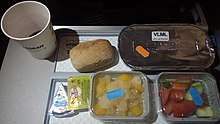Lacto-ovo vegetarianism

Lacto-ovo vegetarianism or ovo-lacto vegetarianism is a type of vegetarianism which allows for the consumption of animal products such as eggs and dairy. Unlike pescetarianism, it does not include fish or other seafood. A typical ovo-lacto vegetarian diet may include fruits, vegetables, grains, nuts, seeds, herbs, roots, fungi, milk, cheese, yogurt, kefir, and eggs.[1]
Etymology
The terminology stems from the Latin lac meaning "milk" (as in 'lactation'), ovum meaning "egg", and the English term vegetarian, so as giving the definition of a vegetarian diet containing milk and eggs.
Diet
| Plants | Dairy | Eggs | Seafood | Poultry | All other animals | ||
|---|---|---|---|---|---|---|---|
| Vegetarianism | Lacto-ovo vegetarianism | Yes | Yes | Yes | No | No | No |
| Lacto vegetarianism | Yes | Yes | No | No | No | No | |
| Ovo vegetarianism | Yes | No | Yes | No | No | No | |
| Veganism | Yes | No | No | No | No | No | |
| Semi-vegetarianism | Flexitarianism | Yes | Yes | Yes | Sometimes | Sometimes | Sometimes |
| Pollotarianism | Yes | Maybe | Maybe | Maybe | Yes | No | |
| Pescetarianism | Yes | Maybe | Maybe | Yes | No | No | |
In the Western world, ovo-lacto vegetarians are the most common type of vegetarian.[2][unreliable source?] Generally speaking, when one uses the term vegetarian, an ovo-lacto vegetarian is assumed.[3] Ovo-lacto vegetarians are often well-catered for in restaurants and shops, especially in some parts of Europe and metropolitan cities in North America.
Religion

In Indian religions like Hinduism and Buddhism, most individuals are either raised as ovo-lacto vegetarians or lacto vegetarians.[4]
The Bible Christian Church was a Christian vegetarian sect founded by William Cowherd in 1809.[5] Cowherd was one of the philosophical forerunners of the Vegetarian Society founded in 1847. The Bible Christian Church promoted the use of eggs, dairy and honey as God's given food per "the promised land flowing with milk and honey" (Exodus 3:8).[6]
Many Seventh-day Adventist followers are ovo-lacto vegetarians and have recommended a vegetarian diet, which may include milk products and eggs, since late 19th century.[7]
See also
References
- ^ "Archived copy". Archived from the original on 2015-04-27. Retrieved 2015-04-23.
{{cite web}}: CS1 maint: archived copy as title (link) - ^ "Top 7 Types of Vegetarians".
- ^ "Vegetarian (Lacto-ovo vegetarian)".
- ^ Surveys studying food habits of Indians include: "Dairy and poultry sector growth in India", Quote: "An analysis of consumption data originating from National Sample Survey (NSS) shows that 42 percent of households are vegetarian, in that they never eat fish, meat or eggs. The remaining 58 percent of households are less strict vegetarians or non-vegetarians." "Indian consumer patterns" and "Agri reform in India" Archived 2006-12-28 at the Wayback Machine. Results indicate that Indians who eat meat do so infrequently with less than 30% consuming non-vegetarian foods regularly, although the reasons may be economical. "2.3 Growth and Concentration in India[6]". Archived from the original on June 26, 2015. Retrieved November 17, 2016.
{{cite web}}: CS1 maint: bot: original URL status unknown (link) - ^ Julia Twigg (1981). "The Bible Christian Church". International Vegetarian Union.
- ^ John Davis. "A History of Veganism from 1806" (PDF). International Vegetarian Union.
- ^ "A Position Statement on The Vegetarian Diet Adapted from the General Conference of Seventh-day Adventists Nutrition Council". SDADA. Archived from the original on 2012-05-29. Retrieved 2011-10-03.
